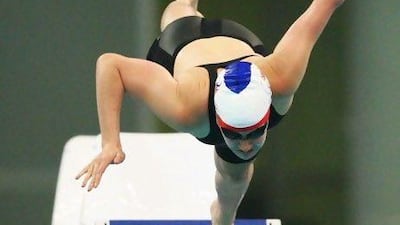For Claire Cashmore, childhood taunts helped unearth the competitive spirit that has propelled her to her third Paralympics.
Born in England, Cashmore moved to Dubai at the age of five where her love of swimming was fostered.
At the age of nine, a rival taunted Cashmore but it was a barb that backfired, instead making her doubly determined to prove her young detractor wrong.
She said: "Dubai is where my love of swimming came, especially when a girl told me I couldn't swim because I would go round in circles and I only had one arm.
"And I was like 'I'm going to prove you wrong' and I beat her. I really wanted to go up to her and go 'Ah, so can I not swim?' But I was a better sport."
Returning to Britain aged 11, Cashmore then spent four years at Kelly College in Devon, with its emphasis on sport.
In 2004, aged 16, Cashmore made her Paralympic debut in Athens where she won bronze in both the S9 100 metres backstroke and the SM9 200m individual medley. Four years later in Beijing, Cashmore secured another third place - this time in the SB8 100m breaststroke.
World short-course and European titles have followed as have two silver medals at the long-course (50m) World Championships in Eindhoven in 2010.
With London upon us, Cashmore is open about the thrill she is expecting from the home crowd at the Aquatics Centre, saying: "I've been dreaming of it for I don't know how many years and what it is actually going to be like. It is going to be so exciting."
Cashmore, 24, is studying linguistics and phonetics at Leeds University and part of her course investigated why some speak patronizingly to those with a disability and the psychology behind that.
For Cashmore, it is something that over the years has improved but she admits there is still some way to go.
"People have got a lot more aware. Channel 4 [television] has done a fantastic job to get people aware of disability and not be so ashamed.
"I quite often have kids come up to me in the street and ask questions and the mum and dad will slap them over the head and say 'shhh, don't ask questions' whereas I am much more 'come and ask me'.
"They need to learn - children are inquisitive they are only asking because they want to know."
She added: "I think it is important that people are exposed to someone with a disability and it is normal and there are so many opportunities out there for people in any kind of sport or any other area."
sports@thenational.ae
Follow us

